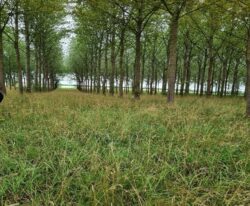Jyoti Narsude: how will this COP affect land, nature, and the people?
As COP30 heads to the heart of the Amazon, the stakes for land and nature have never been higher.

Jyoti Sudhakar Narsude explores how this COP could be a turning point for climate justice, forest protection, and Indigenous rights. With global pressure mounting, Jyoti argues that COP30 must move beyond promises to deliver real action—redefining land not just as a resource, but as a foundation for resilience, equity, and planetary health.
Jyoti is a PhD researcher at the School of Geography, University of Leeds, and a COP30 delegate.
The The Intergovernmental Panel on Climate Change (IPCC) states that worldwide, ice-free land is occupied by dissolution: 37% pasture, 22% managed forests, 12% cropland, and barren or rocky systems, and only 0.7% of land has little disturbance and unforested ecosystems (Nabuurs, 2022). These numbers reveal the significant pressure on terrestrial resources, particularly as the current world population has increased from 3 billion in the 1960s to almost 8 billion today (Nabuurs, 2022) and are inextricably linked to climate change, rendering land stewardship a necessary part of climate action.
Ahead of the 30th session of the United Nations Framework Convention on Climate Change (COP30) in Belém, Brazil, all eyes are on the Amazon rainforest, an emblematic example of biodiversity and environmental sensitivity. This year’s summit is not just a run-of-the-mill diplomatic conference; it marks the 10th anniversary of the Paris Agreement and has been dubbed the “Implementation COP,” where promises need to be translated into action.
Development of nature and climate since the Paris agreement

Poplar agroforestry at University of Leeds Research Farm as climate climate-friendly land management tool (Photo Credit: Jyoti Narsude)
The Paris Agreement set the stage for integrating nature into climate action. Article 5 explicitly acknowledges that protecting and enhancing greenhouse gas sinks, such as forests, is crucial. Since then, the role of nature in climate discussions has risen to the forefront. COP26 and COP27 recognised nature's contribution to keeping the 1.5°C goal within reach, as well as to improving adaptation. The UAE Consensus at COP28 called for the conservation, protection, and restoration of ecosystems, including action to halt and reverse deforestation and forest degradation by 2030 (UNFCCC, 2023). The result of the Global Stocktake (GST) connected climate ambitions with the Kunming-Montreal Global Biodiversity Framework, highlighting that these are interconnected rather than independent. The UAE Framework for Global Climate Resilience further established a dedicated target for ecosystems and underscored the importance of nature-based solutions for adaptation. Mission 1.5 was initiated by the Troika of Presidencies (UAE, Azerbaijan and Brazil) to foster a supportive environment for aligning national policies to keep global warming below 1.5°C. At the 8th Ministerial on Climate Action held in China in July 2024, the Troika underlined that forest conservation, protection and restoration are a driver of climate action. This joint effort should help to define the strategic approach for COP30 and move towards placing nature-based solutions at its core.
COP30 in the Amazon: A historic opportunity for land-based climate action
Brazil has a unique moment to drive transformative change across the land sector. The summit should deliver an actionable Zero Deforestation framework that brings together food systems, commodity supply chains, and the rights of indigenous people and local communities (IPLCs). Scaling up climate commitments to cover the entire land sector will require unlocking finance for standing forests, sustainable supply chains, a future-proof food supply and partnerships between producer and consumer nations.. Acknowledging land tenure security and indigenous stewardship in this way is critical for preventing deforestation and conserving ecosystems. As an action-oriented COP 30 can set targets and monitoring systems for forest- and land-based initiatives. The Mitigation Work Programme (MWP) will highlight forest sector solutions and the circles of the Presidency – including the Peoples’ Circle, Ethical Stocktake Circle and Finance Ministers Circle – will make clear forests and land’s role in climate, biodiversity and social equity (WWF, 2023).
Call for Climate Justice
In a powerful statement, more than 240 groups call on COP30 to confront the historical legacies of climate injustice, such as colonialism and the dispossession of land. They insist that climate justice is only authentic if it involves reparations and acknowledgement of the rights to land and decision-making of their countries indigenous and African-descendant communities. This demand for justice is a crucial component of the COP30 mandate, ensuring that equity and inclusion are at the heart of climate solutions. Developing countries at COP29 fretted over the 300 billion-dollar loss and damage fund, set for 2035. For COP30, there are high hopes to raise this to 1.3 trillion USD by 2035, according to the UNFCCC roadmap. But conditionalities and limitations on how developing countries can use climate finance remain a sticking point. Dealing with these issues openly is necessary if trust is to be built and resources are to be distributed equitably.
To catalyse the implementation of the forest and land mitigation commitments under the GST, there should be a dedicated work programme on climate and nature (UNFCCC, 2023). Presidential and Action Agenda campaigns can be initiated to strengthen both government and private-sector responses to forest issues. “Countries should be incentivised to properly account for forests” in their Nationally Determined Contributions (NDCs), which highlight the importance of terrestrial and marine ecosystems as carbon sinks, and the need to respect social and environmental safeguards. COP30, in short, should be an opportunity to translate global commitments into practical solutions. It breathes new life into financing modalities, negotiating templates and policy avenues for backing land-based climate action — notably in developing countries. Grounding ecological and social integrity in land management, COP30 could also redefine how we value and manage the land—no longer a resource but a basis for climate justice, sustainable development and planetary health.
References
Nabuurs, G-J., Mrabet, R., Abu Hatab, A., Bustamante, M., Clark, H., Havlík, P., House, J., Mbow, C., Ninan, K.N., Popp, A., Roe, S., Sohngen, B. & Towprayoon, S. (2022) Agriculture, Forestry and Other Land Uses (AFOLU). In: Shukla, P.R., Skea, J., Slade, R., Al Khourdajie, A., van Diemen, R., McCollum, D., Pathak, M., Some, S., Vyas, P., Fradera, R., Belkacemi, M., Hasija, A., Lisboa, G., Luz, S. & Malley, J. (eds.) Climate Change 2022: Mitigation of Climate Change. Contribution of Working Group III to the Sixth Assessment Report of the Intergovernmental Panel on Climate Change. Cambridge University Press, Cambridge, UK and New York, NY, USA. doi: 10.1017/9781009157926.009
Food and Agriculture Organisation of the United Nations (FAO) (2025). Access to climate finance. [online] Available at: https://www.fao.org/climate-change/what-we-do/access-to-climate-finance/en [Accessed 1 Oct. 2025].
UNFCCC (2023) Outcome of the first global stocktake. Draft decision -/CMA.5. Proposal by the President. [online] Available at: https://unfccc.int/sites/default/files/resource/GST_1_0.pdf [Accessed 1 Oct. 2025].
Chiriac, D., Vishnumolakala, H. & Rosane, P. (2022) Landscape of Climate Finance for Agriculture, Forestry, Other Land Uses, and Fisheries. Climate Policy Initiative. [online] Available at: https://www.climatepolicyinitiative.org/publication/landscape-of-climate-finance-for-agriculture-forestry-other-land-uses-and-fisheries/ [Accessed 1 Oct. 2025].
UNFCCC (2023) Outcome of the first global stocktake. Draft decision -/CMA.5. Proposal by the President. [online] Available at: https://unfccc.int/sites/default/files/resource/GST_1_0.pdf [Accessed 1 Oct. 2025].
UNFCCC (2023) Outcome of the first global stocktake. Draft decision -/CMA.5. Proposal by the President. Advance Unedited Version. [online] Available at: https://unfccc.int/sites/default/files/resource/cma4_auv_2_cover_decision.pdf [Accessed 1 Oct. 2025].
Learn more about the University of Leeds at COP30 here
Stay up to date with Jyoti Sudhakar Narsude
- To hear more from Jyoti, follow her on LinkedIn
Stay up to date with the Priestley Centre
- For enquiries about working with the Priestley Centre please contact us via email at [email protected]
- Follow us on LinkedIn, Bluesky, YouTube
- To receive our quarterly newsletter, sign up to our mailing list.
